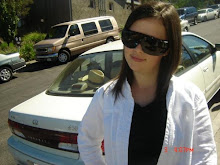 When my sister Annie first heard about the project, she sent me an e-mail with book suggestions. American Shaolin
When my sister Annie first heard about the project, she sent me an e-mail with book suggestions. American ShaolinMatthew Polly was scrawny and insecure during his childhood in Kansas, always a favorite target of neighborhood bullies. He kept a running mental list of Things That Are Wrong With Matt, and no matter what he did to eliminate an item from the list, it was inevitably replaced by something else that he found lacking in himself. Matt developed an interest in kungfu after seeing David Carradine's Kung Fu, and pursued it as a student at Princeton. Not only did he take kungfu lessons, he also studied Chinese and eastern religions. After three years at Princeton, Matt happened to read Iron and Silk by Mark Salzman, a memoir about a Yale student who studies martial arts with a kungfu master in China. Matt decides to take a leave of absence and study with the monks at Shaolin Temple. Although it's difficult to convince his family and friends that he's serious and needs to go through with it, he does make it to China and the Shaolin Temple. He arranges to study with the monks, and remains there for two years.
My first reaction the the book? I would NEVER do something like this! It's SO impractical! I just don't have the cojones or the desire to embark upon this kind of journey. Matt leaves for China in 1992, long before you could find the location of the Shaolin Temple with a few clicks online. He flies to China, and simply asks around until he finds his way to the temple. Did I mention that he goes to China all by himself? Totally alone. Matt considers himself cowardly (it's on his Things That Are Wrong With Matt list) but I think taking that leap was incredibly brave. I spent a semester in Spain during my junior year in college, but I don't know if I could have done without the other 11 people in my group. I probably wouldn't have even considered going alone.
"It was a shock to discover that after three years of studying Mandarin in college I could not actually speak Chinese."
I can relate! It's one thing to study and speak a second language with other students, but it's completely different to immerse yourself in another country with native speakers. When I was in Spain, it took about two months to feel really comfortable speaking with my host mother and other Spaniards.
Matt, or Bao Mosi as he is known in China, is hysterically funny. I laughed out loud at many points in the book. His observations and commentary on his experiences are so witty and humorous, without taking away from the seriousness of the subject matter.
"I nicknamed her 'Shou Ting,' because I have a weakness for bad puns, and deep down inside I'm not a very nice person."
I giggled over that line for at least two minutes. I really had the feeling while reading that Matt was someone that I would like to know and hang out with. I bet his Facebook statuses would be hilarious.
Not only was the writing funny and personable, it was engaging. The book is intended for readers who may know nothing about Shaolin Temple, kungfu or China. Matt imparts a lot of historical background, detailed explanations of his kungfu routines, and information about Chinese culture. It's a lot of information, but I never felt like I was "learning" and I never got bored. He really cares about what he's writing about, and he makes you care too. And not only do you care about his surroundings, you care about his journey. By the end of his time with the monks, Matt has really grown up. He no longer harbors revenge fantasies about his former bullies, he feels at peace spiritually, and he's certainly more than competent in kungfu. While I did say that I would never do something like this, I would like to think that I would re-consider for the type of reward that Matt earned for himself.
As a professional proofreader, I really appreciated the note on spelling and pronunciation included at the beginning of the book. Matt explains the system he used to romanize the Chinese language in the text and the few exceptions, as well as providing a few tips on pronunciation for the Western readers. But this is by far the point that I appreciated the most:
"...while most American dictionaries spell 'kung fu' as two words, I reduced it to one, 'kungfu,' because I didn't want thousands of orphaned 'fu's populating the pages of my book with no 'ck's to keep them company."
See? Funny. (You'll notice that I used the same spelling throughout as an homage.)
Please read this book. I promise that you will enjoy it. If you do, Annie recommends Angry White Pajamas by Robert Twigger for contrast.








